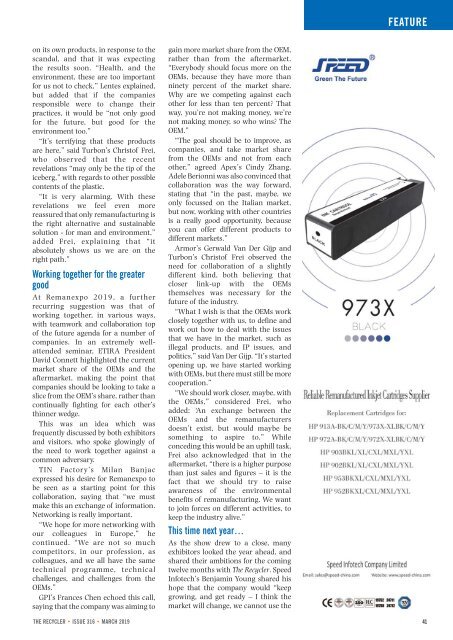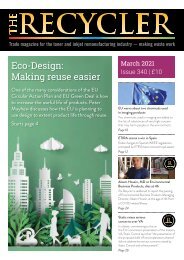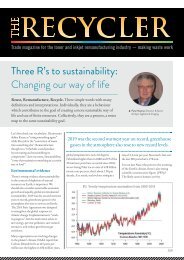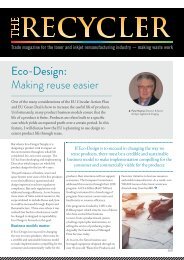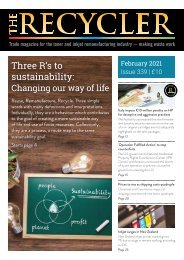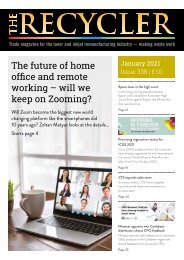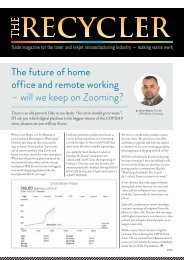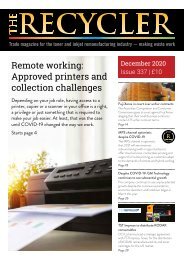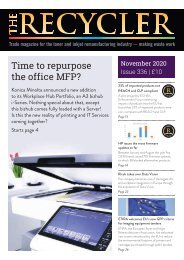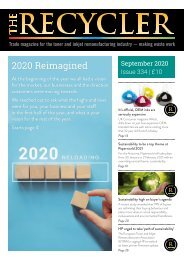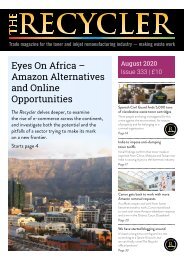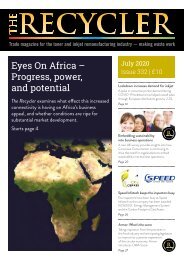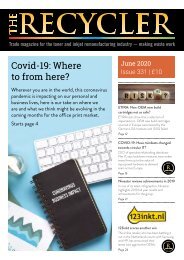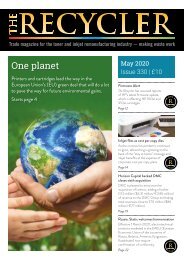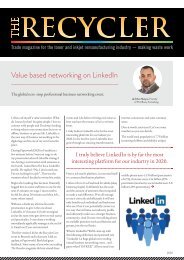The Recycler Issue 316
Create successful ePaper yourself
Turn your PDF publications into a flip-book with our unique Google optimized e-Paper software.
FEATURE<br />
on its own products, in response to the<br />
scandal, and that it was expecting<br />
the results soon. “Health, and the<br />
environment, these are too important<br />
for us not to check,” Lentes explained,<br />
but added that if the companies<br />
responsible were to change their<br />
practices, it would be “not only good<br />
for the future, but good for the<br />
environment too.”<br />
“It’s terrifying that these products<br />
are here,” said Turbon’s Christof Frei,<br />
who observed that the recent<br />
revelations “may only be the tip of the<br />
iceberg,” with regards to other possible<br />
contents of the plastic.<br />
“It is very alarming. With these<br />
revelations we feel even more<br />
reassured that only remanufacturing is<br />
the right alternative and sustainable<br />
solution - for man and environment,”<br />
added Frei, explaining that “it<br />
absolutely shows us we are on the<br />
right path.”<br />
Working together for the greater<br />
good<br />
At Remanexpo 2019, a further<br />
recurring suggestion was that of<br />
working together, in various ways,<br />
with teamwork and collaboration top<br />
of the future agenda for a number of<br />
companies. In an extremely wellattended<br />
seminar, ETIRA President<br />
David Connett highlighted the current<br />
market share of the OEMs and the<br />
aftermarket, making the point that<br />
companies should be looking to take a<br />
slice from the OEM’s share, rather than<br />
continually fighting for each other’s<br />
thinner wedge.<br />
This was an idea which was<br />
frequently discussed by both exhibitors<br />
and visitors, who spoke glowingly of<br />
the need to work together against a<br />
common adversary.<br />
TIN Factory’s Milan Banjac<br />
expressed his desire for Remanexpo to<br />
be seen as a starting point for this<br />
collaboration, saying that “we must<br />
make this an exchange of information.<br />
Networking is really important.<br />
“We hope for more networking with<br />
our colleagues in Europe,” he<br />
continued. “We are not so much<br />
competitors, in our profession, as<br />
colleagues, and we all have the same<br />
technical programme, technical<br />
challenges, and challenges from the<br />
OEMs.”<br />
GPI’s Frances Chen echoed this call,<br />
saying that the company was aiming to<br />
gain more market share from the OEM,<br />
rather than from the aftermarket.<br />
“Everybody should focus more on the<br />
OEMs, because they have more than<br />
ninety percent of the market share.<br />
Why are we competing against each<br />
other for less than ten percent? That<br />
way, you’re not making money, we’re<br />
not making money, so who wins? <strong>The</strong><br />
OEM.”<br />
“<strong>The</strong> goal should be to improve, as<br />
companies, and take market share<br />
from the OEMs and not from each<br />
other,” agreed Apex’s Cindy Zhang.<br />
Adele Berionni was also convinced that<br />
collaboration was the way forward,<br />
stating that “in the past, maybe, we<br />
only focussed on the Italian market,<br />
but now, working with other countries<br />
is a really good opportunity, because<br />
you can offer different products to<br />
different markets.”<br />
Armor’s Gerwald Van Der Gijp and<br />
Turbon’s Christof Frei observed the<br />
need for collaboration of a slightly<br />
different kind, both believing that<br />
closer link-up with the OEMs<br />
themselves was necessary for the<br />
future of the industry.<br />
“What I wish is that the OEMs work<br />
closely together with us, to define and<br />
work out how to deal with the issues<br />
that we have in the market, such as<br />
illegal products, and IP issues, and<br />
politics,” said Van Der Gijp. “It’s started<br />
opening up, we have started working<br />
with OEMs, but there must still be more<br />
cooperation.”<br />
“We should work closer, maybe, with<br />
the OEMs,” considered Frei, who<br />
added: ‘An exchange between the<br />
OEMs and the remanufacturers<br />
doesn’t exist, but would maybe be<br />
something to aspire to.” While<br />
conceding this would be an uphill task,<br />
Frei also acknowledged that in the<br />
aftermarket, “there is a higher purpose<br />
than just sales and figures – it is the<br />
fact that we should try to raise<br />
awareness of the environmental<br />
benefits of remanufacturing. We want<br />
to join forces on different activities, to<br />
keep the industry alive.”<br />
This time next year…<br />
As the show drew to a close, many<br />
exhibitors looked the year ahead, and<br />
shared their ambitions for the coming<br />
twelve months with <strong>The</strong> <strong>Recycler</strong>. Speed<br />
Infotech’s Benjamin Young shared his<br />
hope that the company would “keep<br />
growing, and get ready – I think the<br />
market will change, we cannot use the<br />
THE RECYCLER • ISSUE <strong>316</strong> • MARCH 2019<br />
41


